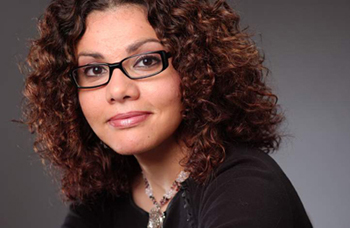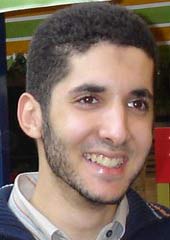Die kluge ägyptische Journalistin Mona Elthahawy hat eine spannende Kontroverse mit führenden ägyptischen Muslimbrüdern angezettelt. In einem Artikel, der in der jüdischen Tageszeitung „Forward“ erschien, schrieb sie: „Ich stelle mich vor die Muslimbruderschaft“. Darin berichtet sie von einem Besuch in der Kairoer Zentrale vor zwei Jahren, bei dem sie mit dem Führer der Bruderschaft, Mahdi Akef, sprechen konnte.

Mona Eltahawy
The first time I went to interview the Muslim Brotherhood, in 1995, an officer manager at their headquarters on the Nile opened the door with one hand and gave me a headscarf to wear with the other. The second time I went to interview the Muslim Brotherhood, in 2005, no headscarf awaited me.
Es hatte sich also einiges getan in der Bruderschaft, so Eltahawys Eindruck. Dennoch war sie schockiert, als Akef im Gespräch auf ihre Frage hin, ob die ägytische Bruderschaft an der Macht schlecht für die Frauenrechte sein werde, folgendes antwortete:
“No,” Akef replied, “and my proof is that although you’re naked, you were allowed to enter my office.”
I was wearing a short-sleeved t-shirt and pants.
Es ergab sich folgender Schlagabtausch:
“I am not naked,” I reminded him. “The verses in the Koran concerning women’s dress have been interpreted differently.”
“According to God’s law, you are naked,” he replied. “Your arms are naked, your head is naked. There is only one interpretation.”
One interpretation? So much for pluralism. Clearly, the Muslim Brotherhood had quite some way to go.
Trotzdem, so Eltahawy, müsse sie als säkulare und liberale Ägypterin die Präsenz der Muslimbruderschaft auf der politischen Bühne Ägyptens verteidigen:
If I don’t, then I am just as guilty as the regime that has for decades sucked the oxygen out of the body politic — and with Gamal Mubarak being groomed to take over the presidency from his aging father, the regime seems set to rule for another generation.
Besides the state, the Brotherhood is the last man standing in Egypt. We’re down to the state and the mosque. The Muslim Brotherhood must remain on Egypt’s political stage, not least so that its ideas are out in the open and can be challenged.
Eltahawy wendet sich gegen die brutale Unterdrückung der Muslimbrüder in der letzten Zeit. Sie sieht darin einen direkten Einfluss der amerikanischen Wende weg von der Demokratisierungsagenda im Zeichen des Irak-Desasters. Man lässt dem Mubarak-Regime freie Hand bei der Unterdrückung der einzig relevanten Opposition:
So, “naked” as I am, I’ll continue to defend the Muslim Brotherhood’s right to be on that stage.
Auf diese Intervention hin bekam Mona Eltahawy eine interessante Antwort von einem der jüngeren Muslimbrüder, die wiederum im jüdischen Forward veröffentlicht wurde: Ibrahim El Houdaiby, der Redakteur der englischsprachigen Website Ikhwanweb, begrüßt Eltahawys Menschenrechts-Engagement und sagt, die Muslimbrüder ihrerseits hätten sich auch für andere Oppositionelle, die von Mubarak verfolgt wurden – wie etwa Ayman Nur oder die religionskritischen Blogger Karim Amer und Sandmonkey – eingesetzt.

Ibrahim El Houdaiby
Hoch interessant, was El Houdaiby zum Kopftuch zu sagen hat:
Not wearing the hijab, or headscarf, makes a woman unveiled, not naked. I realize how offensive it is to call someone “naked” for not wearing a headscarf, and I find Akef’s comment unjustifiable.
To be clear, I support Akef’s stance on wearing the hijab, and like him view it as a religious obligation. There has been consensus on that among Islamic scholars for centuries.
Yet this has got nothing to do with the Muslim Brotherhood as a political group. While we believe that wearing the hijab is an obligation, we believe it is an individual woman’s choice to uphold it — a choice that the state should not interfere in.
There is a difference between what Islamists, and Muslims in general, regard as correct, and what they regard as enforceable by the state. This difference has unfortunately been blurred by the misguided practices of some contemporary Islamist systems, and in order to clear up any misconceptions the literature of moderate Islamist scholars needs to be scrutinized further.
Dies wäre in der Tat eine bedeutender Schritt vorwärts in Richtung auf echte Religionsfreiheit: Der Glaube, das Kopftuch sei eine religiöse Pflicht wird deutlich getrennt von der Aufgabe des Staates. Die „zeitgenössischen islamistischen Systeme“ werden für ihrer „mißgeleiteten Praktiken“ kritisiert – und es folgt sogar der Aufruf, dies theologisch aufzuarbeiten. es sei durchaus möglich, eine bestimmte theologische Auslegung für die einzig richtige zu halten, sagt El Houdaiby, und doch politisch für Pluralismus zu sein:
Not accepting another interpretation as authentic, however, does not mean attempting to silence it.
…
We understand the rules of democracy, and realize that people have the right to choose to do whatever they want, even if we view their choice as incorrect. At the end of the day, what matters should be neither the Muslim Brotherhood leaders’ opinion nor that of President Hosni Mubarak, but rather the Egyptian people’s opinion, as manifested in ballot boxes in free and fair elections — given, of course, that their decision does not undermine the basic rights or civil liberties of any group or individual.
Das sind erstaunliche Worte.